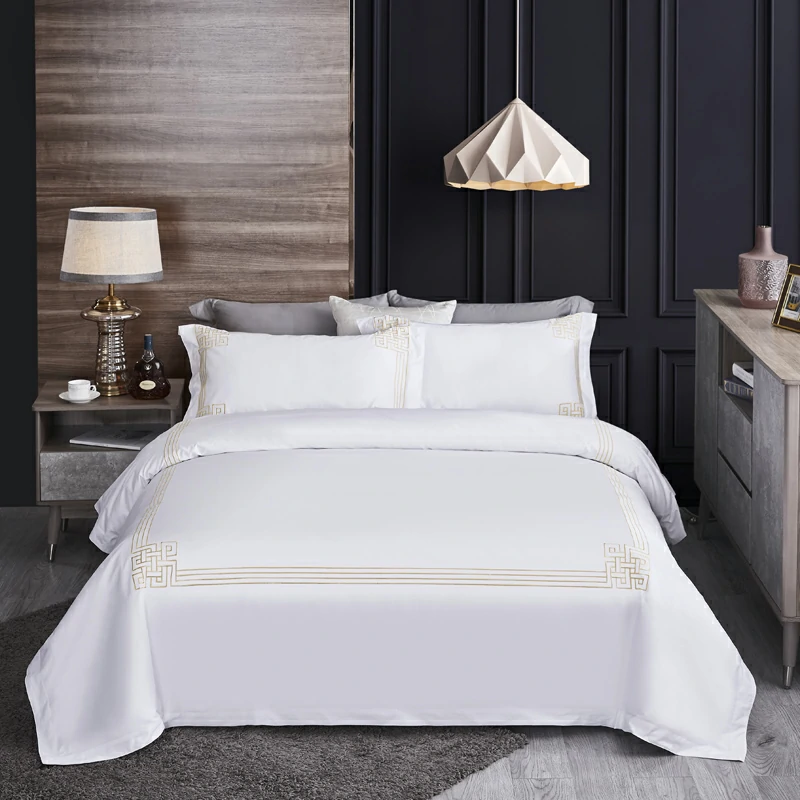In addition to Egyptian cotton and sateen, there are several other popular materials used in hotel bedding sets.
Here are a few examples:
Percale: Percale is a tightly woven fabric typically made from cotton or a cotton-polyester blend. It is known for its crisp and cool feel, making it a popular choice for hotel bedding. Percale bedding sets often have a matte finish and are durable and breathable.
Microfiber: Microfiber is a synthetic material made of finely woven fibers, usually polyester. It is known for its softness, wrinkle resistance, and affordability. Microfiber bedding sets are often lightweight, hypoallergenic, and easy to care for.
Bamboo: Bamboo bedding sets have gained popularity due to their eco-friendly and sustainable nature. Bamboo fabric is derived from bamboo pulp and is known for its softness, breathability, and moisture-wicking properties. It can provide a silky and luxurious feel similar to sateen.
Linen: Linen is a natural fabric made from flax fibers. It is highly breathable, moisture-wicking, and known for its coolness, making it suitable for warmer climates. Linen bedding sets have a relaxed and casual look and often develop a soft, lived-in feel over time.
Tencel or Lyocell: Tencel, also known as Lyocell, is a fabric made from cellulose fibers derived from sustainably sourced wood pulp, usually from eucalyptus trees. Tencel bedding sets are known for their softness, smoothness, and moisture-wicking properties. They are also environmentally friendly and have excellent temperature regulation.
These materials offer different characteristics and benefits, so you can choose the one that aligns with your preferences in terms of feel, durability, and sustainability. When shopping for hotel-style bedding sets, check the product descriptions or labels to identify the specific materials used in the set.
What are the main differences between Tencel and bamboo bedding in terms of feel and performance?
Tencel and bamboo are both popular materials used in bedding sets, and while they share some similarities, they also have distinct differences in terms of feel and performance.
Here’s a comparison of Tencel and bamboo bedding:
Feel:
Tencel: Tencel fabric has a smooth and silky feel. It is often described as being softer than silk and cooler than linen. Tencel drapes well and has a luxurious texture that can provide a comfortable and indulgent sleeping experience.
Bamboo: Bamboo fabric has a soft and smooth feel similar to silk or cashmere. It is often described as being silky, luxurious, white hotel bedding set and slightly cooler to the touch. Bamboo bedding can offer a plush and cozy sensation.
Performance:
Tencel: Tencel is known for its excellent moisture-wicking properties. It can efficiently absorb moisture from the body, keeping you cool and dry throughout the night. Tencel is also breathable and has good temperature regulation, making it suitable for individuals who tend to sleep hot.
Bamboo: Bamboo fabric is highly breathable and has natural moisture-wicking abilities. It can effectively wick away moisture from the body, promoting a cooler and more comfortable sleep environment. Bamboo bedding is also known for its antimicrobial and hypoallergenic properties, making it a suitable choice for individuals with allergies or sensitive skin.
Sustainability:
Tencel: Tencel is considered an eco-friendly and sustainable fabric. It is derived from sustainably sourced wood pulp, typically from eucalyptus trees. The production process of Tencel involves a closed-loop system that minimizes waste and utilizes environmentally friendly solvents.
Bamboo: Bamboo is also considered a sustainable material. Bamboo plants are fast-growing and require minimal water and pesticides. However, the process of turning bamboo into fabric involves chemical processing, which can vary in terms of environmental impact depending on the specific manufacturing methods used.
Both Tencel and bamboo bedding offer softness, breathability, and moisture-wicking properties, making them suitable for individuals who prioritize comfort and temperature regulation during sleep. Consider your specific preferences, such as the feel you desire and any specific performance features you value, when choosing between Tencel and bamboo bedding.

